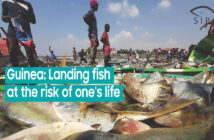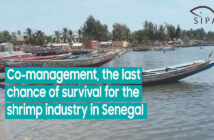“It [may]not be my responsibility to change the whole country but I think it is my responsibility to change my immediate environment. The small impact that I can make, I am doing it now by selling fish and vegetables to my community,” said Anderson.
By George Harris
Amidst low capital, limited materials and condemnation, Devine Anderson is making fortune for himself and his community through an intensive fish farming system in Kaibah Community, outside the Barnesville Estate.
Anderson who returned to Liberia after a long stay in Nigeria as a refugee said that his dream to give back to his homeland was enough courage to venture into fish farming
“…It [may]not be my responsibility to change the whole country but I think it is my responsibility to change my immediate environment. The small impact that I can make, I am doing it now by selling fish and vegetables to my community,” said Anderson.
In spite his vision to provide some basic nutrients and employment to his community, Anderson saw challenges that made his dream almost impossible but he the young farmer improvised to beat the odds.
“When I first started in 2015, there was nothing I could find about fish farming. I was compelled to start from the ground [scratch]. I had to experiment lot of things to make sure that it worked. I built a tank that I was not sure that it will last but it stay up to 2016, [after the tank construction], I started to look for fish but I did not get fish anywhere [certified tilapias seller], as a result, I bought fish from community children to experiment. The fish was doing fine, the tank did not break and that gave me the courage to scale up,”
Anderson’s farm, “Garden Farm” is steadily growing in its operation size and impact. Since its operation begun in 2015, the farm is witnessing an increase in fish and feed productions.
“At first, I was producing three hundred tilapias and about one hundred catfish but currently, I have a capacity where I can produce eight thousand catfish and forty-six thousand tilapias,” Anderson said, “I also produced 10kg of feed from the beginning of our operation but currently I am producing 120kg of fish feed per day.”
The young farmer is the only local fish feed producer who is competing with fish feed importers in the country. Anderson dries, grinds and mixes vegetables leaves, weed brand and yeast from beer factory to produce his local fish feed.
He disclosed that the employment of modern farming technology and the Liberia Agribusiness Development Activity (LADA) are sources of his farm success.
“I realized that the only way I could do fish farming in a most successful way was to employ a technology driven approach—out of which an intensive fish farming system can be derived. With this method [Intensive Fish Farming System] one can produce more fish in [ten square meter].
“Also LADA has been the only organization identifying with us. The organization served as a guarantor, so that I can get a loan to upscale my business. Moreover, LADA provided me a machine to increase the production of my fish feed through that, I am providing fish feed to other farmers. Moreover,” said Anderson
LADA is an initiative by the “USAID’s Feed the Future Program” with the purpose to expand access to quality inputs, finance, mechanization, agricultural advice and market to strengthen food security and increase smallholder farmers’ income across Liberia.
In spite of limited fish farming materials and shallow knowledge about the emerging profession in the country, Anderson is building the capacity of employees and other fish farmers across the country.




